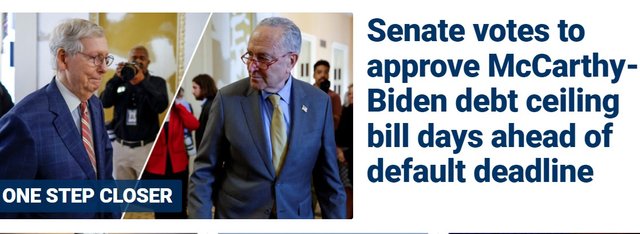Senate Passes Bipartisan Debt Ceiling Bill, Sends to Biden’s Desk
In a historic move, the Senate has recently passed a groundbreaking bipartisan debt ceiling bill, paving the way for a new era of fiscal responsibility. The bill, which received overwhelming support from both sides of the aisle, Senate Passes Bipartisan Debt Ceiling Bill, Sends to Biden’s Desk
Senate Passes Bipartisan Debt Ceiling Bill, Sends to Biden’s Desk
signifies a crucial step forward in addressing the nation's economic challenges. As the legislation makes its way to President Biden's desk, it is poised to shape the future of fiscal policy in the United States.
Understanding the Implications
The passing of the bipartisan debt ceiling bill marks a significant moment in American politics. It reflects a collective recognition of the pressing need to address the nation's growing debt and ensure financial stability for future generations. By transcending party lines, lawmakers have displayed a commitment to finding common ground and working toward the greater good of the country.
A Path to Fiscal Responsibility
The newly passed bill provides a roadmap for achieving fiscal responsibility. It outlines a comprehensive strategy to manage the nation's debt and reduce spending in a prudent and sustainable manner. By implementing targeted measures that prioritize economic growth and long-term stability, the bill aims to strike a delicate balance between fiscal discipline and investments in critical areas such as infrastructure, education, and healthcare.
Read More: Senate Passes Bipartisan Debt Ceiling Bill, Sends to Biden’s Desk
Key Provisions of the Bill
Debt Ceiling Adjustment: The bill includes provisions to adjust the debt ceiling, ensuring that the government can meet its financial obligations without resorting to last-minute negotiations or potential default. This adjustment offers a more stable and predictable framework for managing the nation's debt.
Spending Reforms: To address the issue of excessive spending, the bill incorporates comprehensive reforms that scrutinize government expenditures. By identifying areas of inefficiency and implementing cost-saving measures, these reforms aim to streamline the budgetary process and promote responsible use of taxpayer dollars.
Long-Term Planning: Recognizing the importance of long-term fiscal planning, the bill emphasizes the need for strategic budgeting. It encourages lawmakers to think beyond short-term gains and consider the long-term impact of their decisions on the nation's financial health.
Transparency and Accountability: The bill places a strong emphasis on transparency and accountability in fiscal matters. It establishes mechanisms to track and report spending, ensuring that taxpayers are informed about how their money is being utilized.
Economic Growth Initiatives: The bill includes provisions to stimulate economic growth and job creation. Promoting entrepreneurship, innovation, and investment seeks to bolster the nation's overall economic well-being.
The Impact on the Economy
The passing of this debt ceiling bill is expected to have far-reaching implications for the economy. By providing a framework for responsible fiscal management, it instills confidence in investors and businesses, fostering an environment conducive to growth. Furthermore, the bill's emphasis on long-term planning and targeted investments in critical sectors will likely generate employment opportunities and contribute to sustainable economic development.
Looking Ahead

As President Biden prepares to sign the bipartisan debt ceiling bill into law, the nation stands on the cusp of a new era of fiscal responsibility. The passage of this legislation represents a significant achievement in bridging political divides and prioritizing the long-term interests of the American people. It sets a precedent for bipartisan collaboration and underscores the importance of working together to address complex challenges.
Conclusion
The Senate's passage of the bipartisan debt ceiling bill is a landmark moment in American politics. This legislation not only addresses the pressing issue of the nation's growing debt but also signifies a commitment to fiscal responsibility and long-term planning. As the bill makes its way to President Biden's desk, it promises a brighter economic future, characterized by stability, transparency, and sustainable growth.